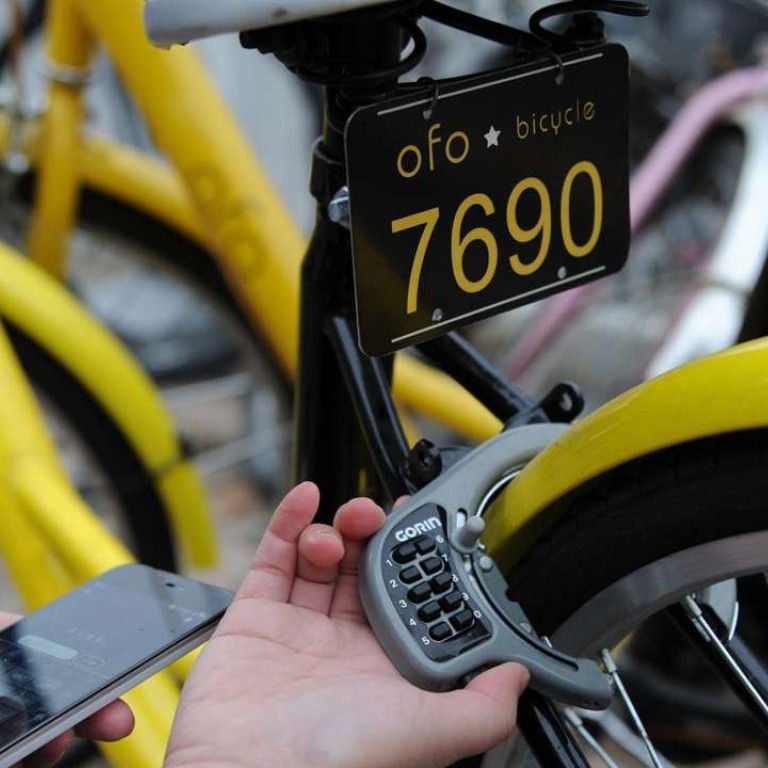
New | Beijing’s Ofo to ship 20,000 bicycles for its ‘Uber for Bikes’ rental service in the UK and US
Ofo is setting its sights outside China to survive competition with 17 bicycle-sharing apps on the mainland
If entrepreneur Dai Wei has his way, Silicon Valley engineers and London college students will soon be able to ride bicycles made by one of the oldest makers in China, with the swipe on their smartphones.
Instead of selling the bicycles, the 25-year-old Dai wants to persuade cyclists to share them through his startup’s “Uber for Bicycles” business model.
Dai’s Beijing Bikelock Technology, also known as Ofo, is poised to ship 20,000 China-made bicycles to the United States and Britain after the Christmas holidays to begin the service.
“Short travels is a global demand,” said Dai, during an interview with the South China Morning Post in Beijing. “There are 3 billion netizens around the world, but the number of people who can ride bicycles is estimated to be more than 5 billion. If we do it right, we can have great potential overseas.”
Founded in 2014, Dai’s Ofo is valued at US$500 million, after securing US$100 million of funding in September from investors including the venture fund backed by Xiaomi Corp’s founder Lei Jun, and Didi-Chuxing, the country’s dominant ride-hailing service and buyer of Uber Technologies’ China business.
Bicycle-sharing is hardly new. From London’s Boris Bikes to Taipei’s plan to encourage commuters to ditch their motor vehicles, there are about 640 bicycle-sharing systems operating around the world, with more than 640,000 of the two-wheelers in use. It’s a market that may expand by 20 per cent annually to generate as much as US$5.8 billion in sales by 2020, according to a forecast by Roland Berger, a consultancy.
What makes startups like Ofo stand out is it allows users to hail a bicycle through their smartphones, and return them wherever they want, instead to set locations. The company goes around after peak hours to collect the bicycles, returning them to pickup points designated by big data analysis as in-demand areas.
Starting as a campus project for university students, Ofo is now available in 22 Chinese cities with 5 million registered users.
The company collects 1 yuan per hour for using its bicycles, and is on the verge of breaking even, Dai said. Ofo plans to charge US$1 per hour for the US market, he said.
“We will definitely be profitable in 2017,” Dai said. “We have already inked partnership deals with many bicycle makers in China. Even though we have to ship bicycles to other countries, our cost is still about one third of those provided by Western competitors.”
To better serve overseas users, Ofo said it will soon launch an English-language app. Shanghai Phoenix Bicycle Co., the oldest producer of two-wheelers since 1897 and an Ofo vendor, will also make larger bicycles more suited to Western physique.
As many as 17 companies have sprouted in the past few months in China with services similar to Ofo, as equity funds and venture capitalists --spurred by cheap capital -- vie to identify the Next Big Thing among New Economy startups in the world’s largest population of Internet users.
China’s bicycle-sharing market is another reason pushing Ofo to set its sights abroad, said Wang Chenxi, analyst at the Beijing-based internet consultancy Analysys.
Ofo isn’t the first to do so. Beijing Mobike Technology, backed by China’s dominant social-messaging service and games maker Tencent Holdings, also announced a plan in November to expand to Singapore in 2017. Tencent is also a shareholder in Didi-Chuxing, which invested in Dai’s Ofo.
“Bicycle sharing is a business where the winner takes all,” said Analysys’ wang. “There’s no need for two major players. Whomever moves first is expected to gain more funding, and more funding in turn creates market share. The rule to success is how effective a company can make use of its cash.”

